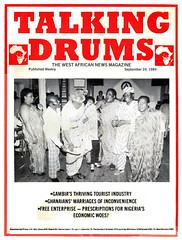You want to be a traditional ruler?
A Touch Of Nokoko
by Kofi Akumanyi
To begin with there was the destoolment in Ghana of Nana Kwantwi Barima II, the Adensihene by the Asantehene Otumfuo Opoku Ware some three months ago which became a subject for a rather brief but decisive litigation in the Accra High Court. The Asantehene won the case hands down when the court ruled that "the Asantehene has power to destool any chief in Ashanti". The legal experts and academics are still arguing on the merits of that controversial decision.
In nearby Nigeria, the Ooni of Ife, Oba Kunade Sijuwade, Olubase II and the Emir of Kano, Alhaji Ado Bayero have been suspended from chairmanship of the Oyo and Kano State Councils by the orders of the Federal Military Government. Their crime? They made a trip to Israel without clearance from the governor's office and thereby embarrassed the government.
In Liberia, where Samuel Kanyon Doe, the Commander-in-Chief and President of the Interim National Assembly is adroitly manipulating the programme for the return to civilian rule, the traditional rulers are known to have caused many eyebrows to be raised when early this year they sent messages of support to the head of state not to hand over power to civilians. Perhaps the chiefs have realised that in the political uncertainties that hang over military regimes, traditional rulers in that country stand a better chance of wielding more power over the people than in a civilian regime where the politicians take the centre stage.
But the whole unfortunate present situation used to be quite different. Before the advent of the Europeans to the West Coast of Africa, the traditional ruler was the most powerful man in the area of his jurisdiction. He had the exclusive right to the land, property, and could marry any woman he fancied.
When the British landed in West Africa, they took one look at the French administration and decided to play it safe by administering the country through the chiefs. That way, the blame, if anything went wrong could be shared with the chiefs.
It worked well for sometime since most of them were illiterates and enjoyed the gifts, patronage and, of course, the prestige that accompanied their new status. Then, as education began to take root and enlightenment spread, the few educated chiefs realised that it was not enough to accept schnapps and imported gin in exchange for vital natural resources. They made noises, goaded on by educated people and politicians in the society. The white man clamped down. The independence movement was on.
Then things changed rather dramatically when independence was finally won. In Ghana, Osagyefo Dr Kwame Nkrumah, after dealing with the chiefs over the fight for independence, realised that new alliances had been formed to oppose his mass party. So in an oft-quoted admonition, Nkrumah was supposed to have said that he would "make them run and leave their sandals behind!"
I have taken the trouble to recount this brief history of chieftaincy in West Africa to illustrate the changing fortunes of the institution which incidentally is linked to mine. This is because I am a Chief - well - until a month ago, when I was destooled.
The news broke when one afternoon I received a tersely worded cable in- forming me that the elders of my village had suspended me and the details would be communicated to me later.
The bearers of the message arrived by Ghana Airways and as custom demands they put down a bottle of schnapps to offer prayers to the gods.
"Nana Barima Kantinka (that's my stool name), the elders of the village have sent us all the way here to inform you that you've been suspended as the chief," the first speaker said.
"Now, just wait a minute. Let's get one thing clear. You cannot suspend me. Custom demands that I meet with the full council of elders to thrash out any disagreements between us. As far as I know there's no disagreement..."
"There isn't except that you have consistently refused to come home over the past three years to be the leader of your people."
"Well, that's not fair because from what I hear the people still love me and want me to be their chief." I protested.
"And you've exhibited gross disrespect to the elders of the village in your written replies to requests to come down to sort out stool, land and other properties," the second emissary pointed out.
"Rubbish. There's nothing to this accusation. If you think you can make me run and leave my sandals behind, I can assure you that you've made a big mistake because, as you can see, I'm wearing a pair of shoes!"
"No sweat; your sandals have been removed already."
"How?"
"By proxy."
"It cannot be done. I tell you this is unprecedented!"
"Who says? Remember that there's a revolution going on and the decision-making process has been truncated to achieve rapid results," the second emissary said.
"You surely cannot be serious. I'll challenge this in Accra High Court. Oh yes, I will, if I have to put in my last penny," I said, shaking with uncontrollable anger.
"There's no way you can win. Remember the famous case: Adansihene v Asantehene (1984)?"
"Oh yes, I do. By the way I don't remember you people being part of the council of elders of the village," I said.
"You won't remember us. We are the newly constituted council of elders - The Peoples Defence Committee wing!"
